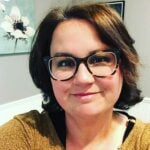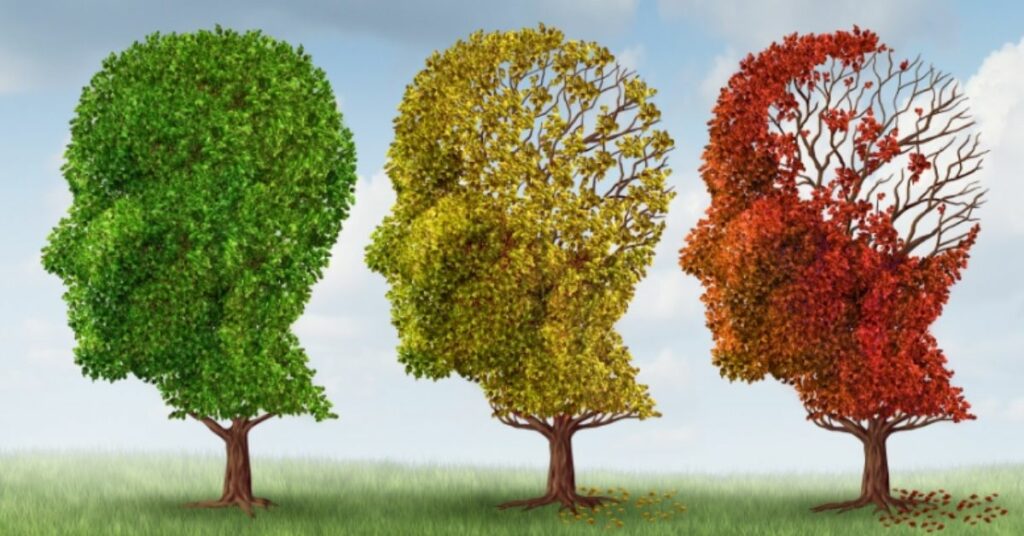What happens after an Alzheimer’s diagnosis
Reviewed by Robert Bogenberger, PhD


Driving from the Mayo Clinic to the Minneapolis airport takes just 75 minutes, and Ed Shaw, MD, MA, has done it many times. But on this day, the ride felt endless.


“At one point, we had to pull over because we were both weeping,” says Shaw. He and his wife of almost 30 years, Rebecca, had just come from getting a second opinion from one of the top doctors in the country. It was official: Rebecca had early-onset Alzheimer’s. She was 53.
“On the side of the road that day, we had the only conversation we would ever have about the diagnosis,” Shaw says. “Rebecca made me promise two things: I would always love her, and I would take care of her through this. And I did both.”
Those promises felt easy in the moment. He’d loved Rebecca for most of his adulthood, they had three grown daughters, and they were a tight-knit family. Of course he would care for her. But Shaw had no idea what the next nine years would look like—and how becoming Rebecca’s caregiver would change the course of his life.
Coping with the three C’s
Shaw, a former radiation oncologist who specialized in brain cancer, was blindsided by Rebecca’s diagnosis. He knew what the profile for early-onset Alzheimer’s should look like, and she didn’t fit it. “Rebecca was athletic, she was a speech pathologist who used her brain constantly, and she had no family history of the disease,” he says.
For many people, a diagnosis of Alzheimer’s comes later in life. According to the Alzheimer’s Association, approximately 6.7 million Americans age 65 and older are living with the condition in 2023.1 Only 5% to 6% of people with the disease develop symptoms before age 65, which is the definition of early-onset (also called “young-onset”) Alzheimer’s.2 But a diagnosis is devastating at any age because there’s no known cure.
Shaw had to deliver many terminal cancer diagnoses during his medical career, but with Rebecca he realized the emotions around an Alzheimer’s diagnosis feel different.
“When you tell someone they have ‘the big C,’ they immediately face their mortality,” Shaw says. “With an Alzheimer’s diagnosis, you’re facing a different yet equally difficult set of C’s: You’re worried about your competence, your capability, and your capacity.” That worry can manifest as anger or depression, among other challenges.
Anger and worry and everything in between
For Vickie Rankins-Anderson, a pastor living in Ohio, her husband Larry’s diagnosis wasn’t a shock. Then 62, he’d been having minor difficulties with his memory and cognitive functioning for a few years.
Larry’s administrative job for the city was becoming more challenging, Rankins-Anderson noticed. “He was going in earlier and staying later. It was taking him much longer to do the job he’d been doing with ease for decades,” she says.
One day, Larry got lost sitting at an intersection he knew well—and panicked to remember the way home. He was diagnosed with Alzheimer’s a few months later.
Larry was angry about his illness for a while, Rankins-Anderson recalls, which was out of character for him. “It was tough. We’d been married 34 years at that point, and I remember telling him, ‘We won’t make it another 34 if this continues,’” she says.
Larry adjusted after a while, but Rankins-Anderson says the initial diagnosis was tough on him and their adult daughter: “She really worries about her dad.”
How therapy can help
Moving forward after an Alzheimer’s diagnosis can be difficult. For Rankins-Anderson and her husband, therapy has made a big difference. Both of them were already therapy advocates, and Rankins-Anderson’s background as a social worker informed her decision to look for professional support around Larry’s illness.
Throughout Rebecca’s treatment, Shaw focused on what his medical training had taught him: Help the patient. He and his daughters had access to some of the best diagnostic and medical resources available, but very little of it pertained to mental health. Only in the late stage of Rebecca’s illness did Shaw realize how much they could all have benefited from working with a mental health professional to help them process their feelings.
Shaw decided to become the mental health resource he hadn’t found for his own family. He walked away from his oncology career to train as a grief and loss counselor. In 2011, he founded the Memory Counseling Program at Wake Forest University School of Medicine in Winston-Salem, North Carolina, which helps families living with and caring for someone with Alzheimer’s or another form of dementia. He has also authored several books, including “The Dementia Care Partner’s Workbook.”
If you or a loved one has received a tough medical diagnosis, you don’t have to go it alone. Browse our directory to find a licensed mental health professional near you.
The role of caregivers
Because Alzheimer’s affects the mind and body, caring for someone with the disease can be especially challenging. Caregivers may have to attend to day or night wandering, emotional outbursts, and inappropriate behavior.3 They may feel frustrated, fearful, or even worried for their own health because the Alzheimer’s patient may no longer be able to offer care in return.
It’s now been two years since Larry was diagnosed. Rankins-Anderson acknowledges it can be frustrating to have to repeat herself or answer questions several times in a row, but she does her best to be respectful. “My goal after the diagnosis was to make sure Larry never feels humiliated,” she says.
Rankins-Anderson has done her own research and worked with a local memory care organization to get educated. Being diligent every day takes its toll, though. In addition to caring for Larry, Rankins-Anderson is both a mother and her elderly father’s only child.
Shaw calls caregivers like Rankins-Anderson “double-decker club sandwiches,” meaning they are caring for three generations of people: themselves, their children, and their parents. “They’re just pulled in so many directions, it isn’t sustainable,” says Shaw.
For this reason, caregivers often experience increased levels of stress and loneliness.4 Taking care of yourself isn’t easy when you’re caring for someone with a terminal illness.
“There’s an inherent paradox in being a caregiver,” Shaw says. “You need to spend more time with the Alzheimer’s patient, yet you also have all these other things pulling you away. You may need to work more to afford the medical bills, you need to spend time with your children, and you need to care for yourself.”
At the center of it all sits the biggest emotional hurdle faced by caregivers: guilt.
What do you do with the guilt?
In my twenties, I watched my father struggle to care for my grandmother after her Alzheimer’s diagnosis. When she became unsafe in her home, he had to make the difficult call to move her to residential care.
My grandmother fought him hard. She had no recollection of wandering away or leaving the stove on overnight. To her, there was no danger. My father was trying to “get rid of her,” she insisted. He still wrestles with the guilt of that decision 17 years after her death. Sadly, it has overshadowed his entire relationship with her.
Shaw isn’t surprised by this story. In his research and work with caretakers, he has found guilt to be their most common emotion: guilt over the level of care they can provide, guilt over feeling frustrated, guilt over having to place a loved one in residential care—there seems to be an endless supply.
Sometimes it feels like every option you have is a terrible one. But if you can find a way to set aside your emotions and look at decisions from a practical and safety standpoint, Shaw says, it can help. “The question is not ‘Is it wrong for me to put my loved one in a care facility?’” he says. “The question is ‘Where’s the safest place for this person to live to get the best care possible?’”
A relationship of memories
After an Alzheimer’s diagnosis, an invisible clock starts ticking. Depending on the progression of the disease, says Shaw, you don’t know how long your clock will tick for. “With a neurodegenerative disease, you have to remember that today will always be the best day, and you need to treat it as such.”
Larry’s illness has been manageable so far, but Rankins-Anderson knows that won’t always be the case. Even so, they try not to look too far down the road. “We’ve both agreed to keep educating ourselves and living in the present,” Rankins-Anderson says.
The Shaws embraced a similar philosophy. After Rebecca’s diagnosis, their family traveled, celebrated holidays together, and spent as much time together as they could. In grieving her death, Shaw was grateful for the memories they’d made during those times.
“When someone we love dies, our relationship with that person changes and becomes one of memories,” Shaw says. “I spent 40 years of my life with Rebecca, and I don’t want to erase a single day of those years. Now our relationship is a relationship of memory—but if you don’t create the memories in the first place, you won’t have them to look back on.”
Keeping the memories alive
Since Rebecca’s death in 2016, Shaw has remarried. “I was the saddest man in town for a long while,” says Shaw, “but life is for the living, and I had to move forward.” His current wife, Claire, was a caregiver to her husband of nearly four decades, who also died from Alzheimer’s.
Shaw and Claire talk openly together about the spouses they lost and remember them with love. “I still think about Rebecca every single hour of every single day,” Shaw says. “I have a wonderful lifetime of memories with her.”

Sources
1 https://www.alz.org/media/Documents/alzheimers-facts-and-figures.pdf/
2 https://www.mayoclinic.org/diseases-conditions/alzheimers-disease/in-depth/alzheimers/art-20048356/
3 https://www.ncbi.nlm.nih.gov/pmc/articles/PMC3774150/
4 https://www.ncbi.nlm.nih.gov/pmc/articles/PMC9392839/
5 https://www.ncbi.nlm.nih.gov/pmc/articles/PMC6402440/
About the author
Amye Archer, MFA, is the author of “Fat Girl, Skinny” and the coeditor of “If I Don’t Make It, I Love You: Survivors in the Aftermath of School Shootings,” and her work has appeared in Creative Nonfiction magazine, Longreads, Brevity, and more. Her podcast, “Gen X, This Is Why,” reexamines media from the ’70s and ’80s. She holds a Master of Fine Arts in creative nonfiction and lives with her husband, twin daughters, and various pets in Pennsylvania.
Related articles

Dementia: Signs, types, causes, treatment
Dementia is a group of neurologic symptoms characterized by a steady decline in...
